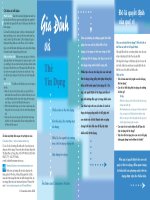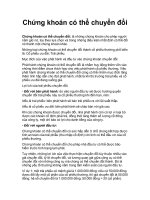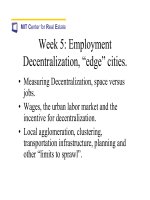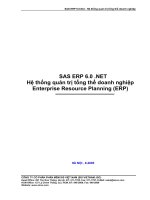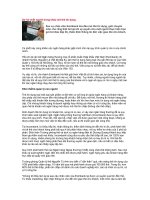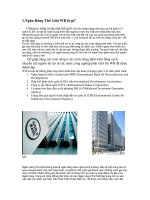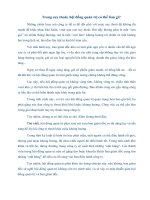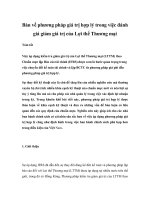The Audit Explosion doc
Bạn đang xem bản rút gọn của tài liệu. Xem và tải ngay bản đầy đủ của tài liệu tại đây (391.45 KB, 58 trang )
The Audit Explosion
Michael Power
Open access. Some rights reserved.
As the publisher of this work, Demos has an open access policy which enables anyone to access
our content electronically without charge.
We want to encourage the circulation of our work as widely as possible without affecting the
ownership of the copyright, which remains with the copyright holder.
Users are welcome to download, save, perform or distribute this work electronically or in any
other format, including in foreign language translation without written permission subject to the
conditions set out in the Demos open access licence which you can read here
.
Please read and consider the full licence. The following are some of the conditions imposed by the
licence:
• Demos and the author(s) are credited;
• The Demos website address (www.demos.co.uk
) is published together with a copy of this
policy statement in a prominent position;
• The text is not altered and is used in full (the use of extracts under existing fair usage rights
is not affected by this condition);
• The work is not resold;
• A copy of the work or link to its use online is sent to the address below for our archive.
By downloading publications, you are confirming that you have read and accepted the terms of
the Demos open access licence.
Copyright Department
Demos
Elizabeth House
39 York Road
London SE1 7NQ
United Kingdom
You are welcome to ask for permission to use this work for purposes other than those covered by
the Demos open access licence.
Demos gratefully acknowledges the work of Lawrence Lessig and Creative Commons which
inspired our approach to copyright. The Demos circulation licence is adapted from the
‘attribution/no derivatives/non-commercial’ version of the Creative Commons licence.
To find out more about Creative Commons licences go to www.creativecommons.org
First published in 1994 by
Demos
9 Bridewell Place
London EC4V 6AP
Tel: 071 353 4479
Fax: 071 353 4481
© Demos 1996
All rights reserved
Paper No. 7
ISBN 1 898309 30 2
Cover illustration by Andrzej Krause
Printed in Great Britain by
White Dove Press
London
Typesetting by Bartle & Wade Associates
This page is covered by the Demos open access licence. Some rights reserved.
Full details of licence conditions are available at www.demos.co.uk/openaccess
Introduction: General themes 1
Auditing and the shaping of accountability 9
Auditing and the rethinking of government 12
Audit as control of control 15
Auditing and the ideal of transparency 18
Auditing and regulatory failure 22
Making things auditable 25
Beyond audit 32
Summary 38
Notes 41
Acknowledgements 53
Demos iii
Contents
This page is covered by the Demos open access licence. Some rights reserved.
Full details of licence conditions are available at www.demos.co.uk/openaccess
We must decide whether our object in setting up the Guardian class
is to make it as happy as we can, or whether happiness is a thing we
should look for in the community as whole.
Plato, The Republic
The people who produce this talk of change – professionals, politi-
cians, administrators, committees, fund raisers, researchers and jour-
nalists – are all mounting a complex sociodrama for each other and
their respective publics. This takes the form of shamanism: a series of
conjuring tricks in which agencies are shuffled, new games invented,
incantations recited, commissions, committees, laws, programmes and
campaigns announced.All this to give the impression that social prob-
lems are somehow not totally out of control. Promises and gestures
can be made, anxieties can vanish away or be exorcised, people can be
reassured or mesmerised.
Stanley Cohen, Visions of Social Control
iv Demos
The audit explosion
This page is covered by the Demos open access licence. Some rights reserved.
Full details of licence conditions are available at www.demos.co.uk/openaccess
The word ‘audit’ is being used in the UK with growing frequency. In
addition to financial audits, there are now environmental audits, value
for money audits, management audits, forensic audits, data audits, intel-
lectual property audits, medical audits, teaching audits, technology
audits, stress audits, democracy audits and many others besides.
1
More
generally, the spread of audits and other quality assurance initiatives
means that many individuals and organisations now find themselves
subject to audit for the first time and, notwithstanding protest and
complaint,have come to think of themselves as auditees. Indeed there is
a real sense in which 1990s Britain has become an ‘audit society’.
2
What are we to make of this explosion of ‘audits’? What changes in
the style of government does it characterise? Is this a distinctive phase
in the life of advanced industrial societies? More critically, how can a
practice whose benefits are being privately questioned as never before
nevertheless come to occupy such an important role in public policy?
Have alternatives to audit really become so unthinkable? Can we no
longer think of accountability without elaborately detailed policing
mechanisms?
This essay explores these questions and goes on to ask whether the
audit explosion rests on firm intellectual and practical foundations or
whether it is as much a symptom of problems as their cure. It asks
whether audits deliver what they promise in the form of greater
accountability, efficiency and quality or whether they in fact fuel the
Demos 1
Introduction:
General themes
This page is covered by the Demos open access licence. Some rights reserved.
Full details of licence conditions are available at www.demos.co.uk/openaccess
problems which they address by, for example, exacerbating distrust.
Finally, it suggests a new agenda for balancing the aspiration for
autonomy with external pressures for accountability.
The nature of the audit explosion is difficult to quantify but there
are a number of indicators. The establishment of the National Audit
Office and the Audit Commission in the early 1980s consolidated the
audit resources of central and local government respectively, and pro-
vided an institutional focus for addressing the economy,efficiency and
effectiveness of publicly funded activities. Both these organisations
have expanded their work, particularly in value for money audit,
bringing intensive scrutiny to many new areas such as the various ele-
ments of the criminal justice system – police, forensic science, crown
prosecution and probation services.
3
Medical and teaching institutions are also set to become subject to
extensive auditing regimes. Medical audits have acquired prominence
in response to a recent government white paper
4
and the newly estab-
lished Higher Education Quality Council (HEQC) and its auditing
activities will become increasingly influential.
5
In the field of quality
assurance more generally, the British Standards Institute has success-
fully promoted BS5750, its standard for quality assurance, and has
used it to develop the BS7750 standard for environmental manage-
ment systems. The European Commission has issued a regulation for a
voluntary Eco-Management and Audit scheme which closely resem-
bles BS7750. The likely take-up of these initiatives is still unclear but it
has been estimated that there is a $200 billion market to be covered by
environmental consulting
6
and the number of consulting organisa-
tions in this area has risen dramatically in the last ten years.
7
The
recent development of accreditation schemes for environmental audi-
tors has provided a further stimulus.
8
The major accounting firms grew very quickly during the 1980s.
The proportion of university graduates entering traineeships with
accountancy firms peaked at over 10% in 1987 and is currently run-
ning at about 8%.
9
Of this number, a majority receive their primary
training in financial audit work although relatively few remain in this
field. One important dimension of the UK audit explosion is that
2 Demos
The audit explosion
This page is covered by the Demos open access licence. Some rights reserved.
Full details of licence conditions are available at www.demos.co.uk/openaccess
unprecedentedly large numbers of young people are being trained and
socialised in the context of auditing.
In traditional financial audit the trends are less conspicuous. While
the number of statutory entities requiring audit has grown steadily, it is
the more intensive role of audit which is more notable. The statutory
financial audit of companies has become more highly regulated and
codified over the last twenty years. The Auditing Practices Committee,
replaced by the Auditing Practices Board in 1991, was formed in 1976
and has produced technical guidance on a wide range of issues.
Developments have been evident in two particular fields: financial
regulation and charities. In the case of both fields, particular statutory
initiatives have extended the role of audit. The Financial Services Act
1986 and the Banking Act 1987 have given auditors newly explicit
responsibilities for assessing internal controls and for communicating
with regulators. Many have complained that the costs of these arrange-
ments are out of proportion to their benefits.
10
Charities have also
come under renewed regulatory scrutiny. Supplementary provisions to
the Charities Act 1992, and accounting guidance specifically tailored
to the sector, reflect a determination to subject these organisations to
increased financial discipline via audit.
11
In other areas, the audit explosion has taken different forms. Safety
and hazard audits in industry have grown naturally from health and
safety legislation. Data audits, which originated in the United States
and are less prominent in the UK, have arisen from concerns about
scientific fraud.
12
UK public science will soon find itself subject to
value for money, intellectual property and technology audits as gov-
ernment seeks both to make science accountable to its funding publics
and to exploit its intellectual property base.
13
Despite these developments, the audit explosion is only in part a
quantitative story of human and financial resources committed to
audit and its extension into new fields. It also concerns a qualitative
shift: the spread of a distinct mentality of administrative control, a per-
vasive logic which has a life over and above specific practices. One cru-
cial aspect of this is that many more individuals and organisations are
coming to think of themselves as subjects of audit. To describe this
Demos 3
Introduction: General themes
This page is covered by the Demos open access licence. Some rights reserved.
Full details of licence conditions are available at www.demos.co.uk/openaccess
logic, this essay relies upon a more oblique and lateral approach to the
phenomenon of audit than quantitative methods would permit.
14
In what follows I will make eight more or less discrete arguments:
First, that despite differences in context and meaning, there is a
common thread to the new uses of the word ‘audit’. Sceptics may doubt
whether the proliferating usage of a single word really signifies any
systematic relationship between the diverse contexts within which it is
invoked.After all, audit is hardly an unambiguous concept and it could
be argued that the practices to which the label is attached are in fact
diverse and that they are constituted by very different bodies of knowl-
edge. For example, it is possible to distinguish audits on the basis of
their relation to the auditee. Many audits, such as in medicine, are
conceived primarily as internal reviews to improve decision-making.
Some of the growth of audits has been of this kind, intended to sup-
port rather than to discipline, and very different from ex post verifica-
tions which have much more the character of a policing role and for
which the independence of the auditor is crucial. The extent to which
audits are oriented towards verification is therefore variable and many
commentators would wish to argue that value for money auditing
plays an entirely different role.
But there are important linkages between the different contexts of
audit. Forms of ‘self-audit’ rely upon bureaucratic procedures which
can in principle be used for independent verification purposes, even in
contexts such as medical audit.
15
Indeed, checklists and protocols for
apparently internal purposes often derive their authority from their
potential use for external verification. Formal documents can be used
outside their original context and in ways unanticipated by those who
may have designed them. In addition, the experience of other manage-
ment areas suggests that even pre-decision reviews may have a ex post
justificatory function.
16
Second, that audit is not just a series of (rather uninteresting) tech-
nical practices. It must also be understood as an idea. It is usual, partic-
ularly in official documents and text books, to conceive of audit only
in terms of its technical and operational qualities. While this image
reinforces its reputation as a boring and parasitic practice, it disguises
4 Demos
The audit explosion
This page is covered by the Demos open access licence. Some rights reserved.
Full details of licence conditions are available at www.demos.co.uk/openaccess
the importance of auditing as an idea. Audit has become central to
ways of talking about administrative control. The extension of audit-
ing into different settings, such as hospitals, schools, water companies,
laboratories, and industrial processes, is more than a natural and self-
evidently technical response to problems of governance and accounta-
bility.It has much to do with articulating values, with rationalising and
reinforcing public images of control. The audit explosion is the explo-
sion of an idea that is internal to the ways in which practitioners and
policy makers make sense of what they are doing.
17
Third, that the spread of audits and audit talk corresponds to a fun-
damental shift in patterns of governance in advanced industrial soci-
eties.As I have suggested above, the explosion of audit practices in new
areas is, at least in the UK, not simply a quantitative intensification.
It arises out of changing conceptions of administration and gover-
nance.
18
Accordingly, to understand this explosion we must dig deeper
and look wider than preoccupations with technical and institutional
issues. I wish to suggest that audit has emerged at the boundary
between the older traditional control structures of industrial society
and the demands of a society which is increasingly conscious of its
production of risks, in fields ranging from the environment, to medi-
cine and finance.
19
It is one of many features of a far-reaching transi-
tion in the dominant forms of administration and control, both in
government and in business.
As such, audit is a way of reconciling contradictory forces: on the
one hand the need to extend a traditional hierarchical command con-
ception of control in order to maintain existing structures of author-
ity; on the other the need to cope with the failure of this style of
control, as it generates risks that are increasingly hard to specify and
control.
Fourth, that the pervasive feature of the new wave of audits is that
they work not on primary activities but rather on other systems of
control. For example, recently proposed quality assurance mechanisms
for higher education require audits of the quality assurance systems of
higher education institutions.
20
This gives the audit a more remote
assurance role than is often understood by the publics which they are
Demos 5
Introduction: General themes
This page is covered by the Demos open access licence. Some rights reserved.
Full details of licence conditions are available at www.demos.co.uk/openaccess
intended to serve. It is in this sense that a gap between words and deed
may exist -commonly referred to in financial audit contexts as an
expectations gap. Audits are often not directly concerned with the
quality of performance, whether environmental, educational or finan-
cial, but rather with the systems in place to govern quality. This ‘polic-
ing of policing’ distinguishes the audit explosion from an older
tradition of engineering-based quality control and its statistically
grounded methods.
Fifth, that audits do not contribute automatically to organisational
transparency. Despite the fact that audit talk is driven by demands for
greater transparency of organisational and individual action, the
capacity of audit to deliver this is problematic. Often the extension of
audits can make organisations more obscure, and the audit process
itself remains publicly invisible despite the commitment to making
organisations transparent. It may be that the audit explosion signifies a
displacement of trust from one part of the economic system to
another; from operatives to auditors.
Sixth, that audits have the remarkable capacity of being invulnera-
ble to their own failure. In recent years the primary concern of public
debate has been with financial audit. Often regarded as a model for
other forms of audit, it has been the subject of extensive critical com-
mentary, set off in large part by the recent demise of the Bank of
Credit and Commerce International (BCCI) and the Maxwell empire.
Rightly or wrongly, corporate collapse is always accompanied by
scrutiny of the role of the auditors and, in some cases, litigation on the
grounds that they have performed their task negligently.
21
One of the surprising features of these experiences is that they tend
not to call into question the role of audit itself. Instead, where audit has
failed,the common response has been to call for more ofit.Indeed,the
great puzzle of financial audit is that it has never been a more power-
ful and influential model of administrative control than now, when
many commentators talk of an auditing crisis.
22
Accordingly, I suggest
that the audit explosion shares an important character with all kinds of
policing: all have problematic criteria of success and are generally only
publicly visible when they are seen to fail. But failure generally leads to
6 Demos
The audit explosion
This page is covered by the Demos open access licence. Some rights reserved.
Full details of licence conditions are available at www.demos.co.uk/openaccess
a call for more policing and only rarely for a thorough analysis of why
policing is failing.
Seventh, that audit is not passive but active. Not only does it shape
the activities which it controls in critical ways but it represents a very
particular conception of accountability. Far from being passive, audit
actively constructs the contexts in which it operates. The most influen-
tial dimension of the audit explosion is the process by which environ-
ments are made auditable, structured to conform to the need to be
monitored ex-post. Audits do not passively monitor auditee perform-
ance but shape the standards of this performance in crucial ways, and
public conceptions of the very problems for which it is the solution.
Eighth, that, notwithstanding the dominance of audits there are
other ways of achieving accountability.
These arguments are intended to demonstrate the institutional
foothold that audit now has in the public imagination while raising
serious questions about this impact. The central concern however is
that the audit explosion has made it difficult to think of alternatives to
itself. But any society or organisation can use very different models of
control and accountability, which can be summarised in the following
lists:
STYLE A STYLE B
Quantitative Qualitative
Single Measure Multiple Measures
External Agencies Internal Agencies
Long Distance Methods Local Methods
Low Trust High Trust
Discipline Autonomy
Ex Post Control Real Time Control
Private Experts Public Dialogue
The audit explosion has involved an overwhelming priority for style A
as the solution to any problem (although value for money auditing
could be regarded as embodying both).
23
Quantified, simplified, ex-post
Demos 7
Introduction: General themes
This page is covered by the Demos open access licence. Some rights reserved.
Full details of licence conditions are available at www.demos.co.uk/openaccess
forms of control by outsiders have increasingly displaced other types
of control. As a result of its institutional power, and its power as an
idea, proponents of alternative styles have found it hard to gain an
audience.
This shift has brought a complex bundle of gains and losses’
24
and it
is not the intention of this essay to suggest that there have been no
gains at all from the growth of audit. However, these gains are likely to
be most visible when used in conjunction with, rather than in opposi-
tion to, elements of control style B. One example of this is when
medical audits help practitioners reflect on clinical methods and man-
agement as well as offering a mechanism for external evaluation.As in
all things, the key is to achieve a balance and compromise. In this essay
my purpose is to offer a diagnosis which may assist in restoring a bal-
ance that has been lost.
8 Demos
The audit explosion
This page is covered by the Demos open access licence. Some rights reserved.
Full details of licence conditions are available at www.demos.co.uk/openaccess
Auditing seems as natural and as necessary as policing. One may argue
about its precise form, for example the balance between prevention
and detection, but there is likely to be agreement that these things are
done because of the way society is. Without them there would be more
fraud, deception, waste, error and poor administration.
Specialised academic stories have formalised these intuitions about
the need for audits: they will be demanded where there are relations of
accountability between two parties together with a certain complexity
or distance such that one, the ‘principal’, cannot easily and directly ver-
ify the activities of the other, the ‘agent’.
25
In recent economic literature
it is argued that it will be rational for the auditee to contract voluntar-
ily to undergo an independent audit in order to make good offices
visible. On this view audits are costly monitoring technologies which
arise naturally under conditions where agents expose principals to
‘moral hazards’, because they may act against the principal’s interests,
and where there are ‘information asymmetries’, because they know
more than the principals. Audit is therefore a risk reduction practice
which inhibits the deviant actions of agents. At the extreme this
implies that ‘Four people performing a cooperative task, say loading
trucks, find that the risk of any one of them slacking is such that they
hire a fifth to monitor their work’.
26
Audits are needed when accountability can no longer be sustained
by informal relations of trust alone but must be formalised, made visible
Demos 9
Auditing and
the shaping of
accountability
This page is covered by the Demos open access licence. Some rights reserved.
Full details of licence conditions are available at www.demos.co.uk/openaccess
and subject to independent validation. This story can be told in rela-
tion to companies. When directors were generally regarded as trust-
worthy and shareholders were perceived as largely ignorant of
business matters, financial audit was very limited. Despite being ruf-
fled by the occasional scandal, confidence in the expertise and honesty
of directors seemed a sufficient guarantee of financial accountability.
This consensus began to dissolve in the 1930s largely as a conse-
quence of the famous Royal Mail case and subsequent reforms to com-
pany law.
27
Over time financial audit began to assume an ever more
important regulatory function. The rise of the corporate economy,
coupled with a statutory audit requirement, ensured its expanding
influence and, by implication, that of its practitioners.
It has become commonplace to interpret these developments in
terms of an erosion of trust. The financial audit arose because the rela-
tionship between management and increasingly distant providers of
finance
28
was becoming problematic. The practical problems were also
reflected – and reinforced – both by abstract economic theories of the
corporation and by the organisation of Anglo-American capital mar-
kets.
29
It came to be accepted that actions could no longer be coordi-
nated by trust and that instead independent ‘outsiders’ had to be used
to restore that trust by providing ex post validations of auditee
performance.
In banking and financial services auditors have in recent years
assumed an increasingly visible regulatory role as informal control
structures have been replaced. The demise of the Maxwell empire, and
the regulatory responses which it has stimulated, can be interpreted as
yet a further episode in the cycle of mistrust ensuring that despite pub-
lic criticism, financial audits will become more intensive and more
central in relation to questions of corporate governance.
30
I want to suggest an alternative to this common view which sees
audit as a response to problems of accountability that have originated
elsewhere. Instead I will argue that audit has spread as much because
of its power as an idea, and that contrary to the assumptions of the
story of lost trust, its spread actually creates the very distrust it is
meant to address.
10 Demos
The audit explosion
This page is covered by the Demos open access licence. Some rights reserved.
Full details of licence conditions are available at www.demos.co.uk/openaccess
It is important not to overstate this claim. It would certainly be far
fetched to say that audit literally creates the pathologies for which it is the
prescribed treatment, but I would not rule this out in particular cases.
People may adapt their behaviour to reflect the fact that they are not
trusted and thereby confirm that they should not be trusted. For example
in higher education it has recently been suggested that academics have
manipulated examination results to conceal matters from funding coun-
cil quality assessors, something which they probably would not have
done in the absence of an auditing process with funding implications.
31
Moreover, in contrast to the popular image of audit as a derived and
parasitic activity, audit shapes conceptions of accountability which
favour audit as the solution.
32
‘Principals’ and ‘agent’, may seem to be
theoretical categories, abstractions from practical realities, but in
different guises such as ‘service provider’ and ‘customer’, they have
become common in official ways of talking about accountability.
But rather than solving the problem of trust, these models of
accountability simply displace it.
33
If those engaged in everyday work
are not trusted, then the locus of trust shifts to the experts involved in
policing them, and to forms of documentary evidence or in manage-
ment assurances about system integrity.
34
Ultimately there is a ‘regress
of mistrust’ in which the performances of auditors and inspectors are
themselves subjected to audit. Thus, Inland Revenue inspection has
been subject to value for money audit as have the police force. A some-
what ironic parallel in finance has been the new regime for ‘auditing
the auditors’ under the requirements of the Eighth European
Community Directive on company law.
These examples show that the audit explosion is not simply a prod-
uct of the rise of specific audit specialists, such as the ‘Big Six’ firms of
accountants. It has much to do with the momentum of audit as an idea
and as a system of knowledge.
Why then has the idea of audit, as a particular approach to account-
ability issues, become so prominent in recent years? How has the logic
of audit become so widely generalised? The answer lies largely in trans-
formations in the role of government and conceptions of governance.
Demos 11
Auditing and the shaping of accountability
This page is covered by the Demos open access licence. Some rights reserved.
Full details of licence conditions are available at www.demos.co.uk/openaccess
A ‘new public management’ has taken shape in the last twenty years,
influenced greatly by images of private sector administration. Public
accountability has been reframed in relation to concepts such as goal
definition, efficient resource allocation, financial performance and
competition.
35
Of course, effectiveness of service delivery remains an
ideal but it is less prominent and forms one, often subordinate, compo-
nent of managerial language in the public sector.
This realignment of public management styles and objectives has a
complex history which is beyond the scope of this analysis. However,
for the purposes of this argument it is essential to understand that the
reinvention of government
36
is informed by two opposite tendencies.
On the one hand, there are centrifugal pressures for the decentralisa-
tion and devolution of services and for turning parts of government
into enterprises, whether through full privatisation or partial ‘enter-
prization’. Deregulatory initiatives and the investment of regulatory
authority in ‘private’ control agencies, such as the Securities and
Investments Board in the context of financial services, also reflect fun-
damental transformations in the style of government, away from
direct provision and towards oversight and rule-setting.
37
On the other hand, there are equally powerful pressures to retain con-
trol over functions that have been made autonomous. Financial over-
sight of Next Steps and other government agencies is one component.
12 Demos
Auditing and the
rethinking of
government
This page is covered by the Demos open access licence. Some rights reserved.
Full details of licence conditions are available at www.demos.co.uk/openaccess
But as important is the intensive regulation of privatised utilities, and
the strong, if delegated, regulation of financial markets in the name of
consumer protection and market integrity.
These competing pressures, to devolve on the one hand and to con-
trol on the other, constitute a distinctive idea of government.
Consistent with a liberal mission, the UK state is increasingly commit-
ted not to interfere or engage in service provision directly; it seeks to
fulfil its role by more indirect supervisory means. In many cases the
state has become regulator of last resort, operating indirectly through
new forms of control (such as the independent regulator) which have
the appearance of being apolitical. The great attraction of audit and
accounting practices is that they appear to reconcile these centrifugal
and centripetal forces better than the available alternatives.
38
The con-
sequence is a displacement in the terms of government discourse,
from service-specific values of teaching, care and so on to more
abstract, financial and quantitative categories.
Why has this redesign of government happened? One plausible
explanation is simply that the fiscal crisis of Western governments
with generous welfare states has made much tighter financial disci-
plines necessary. While it is for future economic historians to judge,
there is no doubt a great deal of truth in this story. However, it is also a
little too lean and rational in its form. And it does not give us a feel for
the particular forms which disciplines have taken.
For there have also been other sources of the audit explosion.
One set of influences has been the growing preoccupations with
quality assurance which can be traced in part to concerns about
industrial competitiveness. Others include the breakdown of the
consensus behind the welfare state, public grievances against
experts and professionals, and the rise of human-made risks in
nearly all areas of life.
In all these cases, the great attraction of the audit idea is its portabil-
ity across such diverse contexts: public sector efficiency, corporate
governance, environmental management systems and so on. The word
symbolises a cluster of values: independent validation, efficiency,
rationality, visibility almost irrespective of the mechanics of the practice
Demos 13
Auditing and the rethinking of accountability
This page is covered by the Demos open access licence. Some rights reserved.
Full details of licence conditions are available at www.demos.co.uk/openaccess
and, in the final analysis, the promise of control. All of these apparent
virtues have come together to make audit a central part of the ‘reinven-
tion of government’. But audit is not just an idea, it is not just a story of
control. What gets done in its name matters and it is this that we must
now consider.
14 Demos
The audit explosion
This page is covered by the Demos open access licence. Some rights reserved.
Full details of licence conditions are available at www.demos.co.uk/openaccess
One of the paradoxes of the audit explosion is that it does not corre-
spond to more surveillance and more direct inspection.
39
Instead,
audits generally act indirectly upon systems of control rather than
directly upon first order activities.
As organisations have grown in scale and complexity direct forms
of inspection have become too expensive. Instead audits have become
organised around internal systems of control. The paradigm example
is the systems audit which is the conventional model for financial
audits. Rather than examining large quantities of transactions, audi-
tors focus on the control systems governing those transactions.
40
This
is equally true of the work of the European Court of Auditors which, of
necessity, relies heavily on the work of national agencies such as the
UK’s National Audit Office. Audit has thereby become the ‘control of
control’,
41
where what is being assured is the quality of control systems
rather than the quality of first order operations. In such a context
accountability is discharged by demonstrating the existence of such
systems of control, not by demonstrating good teaching, caring, manu-
facturing or banking.
Financial auditing texts promote this kind of systems audit as one of
the higher stages in the evolution of the practice. But the truth is that
they are rationalising a shift away from direct contact with practices
which has been primarily driven by cost. The danger is that it is now
more important to an organisation’s legitimacy that it is seen to be
Demos 15
Audit as control of
control
This page is covered by the Demos open access licence. Some rights reserved.
Full details of licence conditions are available at www.demos.co.uk/openaccess
audited than that there is any real substance to the audit. Even the
fiercest critics have become caught up in this logic, as the public issue
has become the independence of auditors rather than their compe-
tence or relevance.
42
What these critics ignore is that even with strong
guarantees of independence, systems based audits can easily become a
kind of ritual,
43
concerned with process rather than substance, and
governed by a ‘compliance mentality’ which draws organisations away
from their primary purposes.
But there is also another reason for the spread of systems audits
beyond the economic unviability of real time inspection. As Day and
Klein have argued in the context of the schools inspectorate, ‘inspec-
tion is about peer judgement by professionals reviewing the work of
their fellow professionals’.
44
The justification for audit is that (at least
for government) trust and valuation has moved away from the profes-
sionals, engineers or carers, so that even independent inspectors are
not deemed trustworthy, because they are embedded within the pro-
fession. Instead only abstract systems of control can be deemed wholly
independent.
This very abstraction from first order detail has greatly helped the
explosion of audits in different fields. Detailed conceptions of quality
may be very different if a supermarket is compared to a hospital. But
the general principles of quality control systems for both can be made
to look very similar, enabling one to compare them at an abstract level.
This is a recent development. In the nineteenth century, such finan-
cial audit guidance as existed was organised along industry-specific
lines; the audit of railways was different from that of banks and so on.
Over time this gave way to more abstract conceptions of the audit
process despite the continuation of industry-specific guidance.
45
The
systems audit represents another stage in this evolution; by abstracting
from local organisational diversity it has enabled audit to assume the
status of an almost irresistible cultural logic.
This mobility and diversity of application of audit is its great attrac-
tion; it can be invoked by marketeers and planners, entrepreneurs and
regulators, consumers and producers, citizens and states. Indeed, as
citizens’ charters take hold audit will no doubt offer the prospect of
16 Demos
The audit explosion
This page is covered by the Demos open access licence. Some rights reserved.
Full details of licence conditions are available at www.demos.co.uk/openaccess
realigning the relationship between patients and doctors, students and
lecturers, passengers and transport operators.
But the institutional strength of audit also brings problems.
Auditees develop creative strategies to cope with being audited. In
many fields there is a sense that the tail of audit is increasingly wag-
ging the dog of accountability and there are doubts about whether
audits really empower the agents which they are intended to serve. It is
to these questions that I now turn.
Demos 17
Audit as control of control
This page is covered by the Demos open access licence. Some rights reserved.
Full details of licence conditions are available at www.demos.co.uk/openaccess
Accountability is so closely associated with ideas of transparency that
the two concepts are often used interchangeably. Audits are usually
justified as enhancing the transparency of individual and corporate
actions to those parties who have an interest in the nature and effects
of those actions. In other words, they are thought to shift power; from
professionals to the public, from experts to stakeholders.
However, if we look more closely at the nature of this transparency
and its democratising potential we soon find problems. How exactly
does audit make things transparent? What are the mechanics of trans-
parency?
To answer these questions we must distinguish two related issues:
the transparency of the audit process and the transparency of audit
findings.
The closure of the Bank of Credit and Commerce International in
1991 provides a good example. It stimulated considerable debate about
the nature of the financial audit function in banks. However, the offi-
cial report by Justice Bingham on the collapse did not concern itself
with the audit process, preferring instead to deal with the requirement
for auditors to report directly to bank supervisors.
46
Its justification
was that questions of technical process are matters for the experts
themselves. Whatever the merits of this view it means that the audit
process, the mechanism by which organisations are made transparent,
is not an object of public policy or open to scrutiny.
18 Demos
Auditing and the
ideal of transparency
This page is covered by the Demos open access licence. Some rights reserved.
Full details of licence conditions are available at www.demos.co.uk/openaccess
Most commentators would agree that this opacity of process, epito-
mised in the BCCI case, is at the heart of what is called the ‘expecta-
tions gap’ in financial auditing: the difference between how financial
auditors are perceived (responsible for the detection of fraud) and how
they see themselves (primarily responsible for forming a professional
opinion on the financial statements).
47
Over the years there has been much debate on this issue within the
financial auditing profession. However, there are really only two possi-
ble solutions: either the users of audit opinions must be educated to
have appropriate (lower?) expectations or the audit product must be
brought into line with those expectations that do exist. In either case,
the pressure is on those involved in financial audit to become more
public about its objectives and process.
But throughout these debates on the audit ‘expectations gap’ there
has been little appreciation that it can provide a useful service to both
users and auditors. This is not as perverse an idea as it sounds, and it
applies to all kinds of policing. Those doing the regulation, policing
or auditing benefit from expectations which exceed what they can
deliver, because these translate into higher fees and prestige.
Meanwhile those in whose name the audits or policing is carried out
benefit from a sense of assurance, even if this is not firmly grounded.
Many would rather not know that their vulnerability is greater than it
seems.
One could go further and suggest that the audit explosion has
occurred at least in part because of, rather than despite, expectation
gaps about the nature of audit. Its very ambiguity has helped it serve
diverse needs,
48
and its opacity has helped its expanding role in gov-
ernment, serving the needs (and status) of the professionals involved,
and comforting politicians and a wider public that things are under
control. Audit can be likened to a shiny black box on the surface of
which the aspirations of new regulatory programmes can be reflected
and made possible. From this point of view, it is actually undesirable to
look beneath the surface of audit practice into the box, to make the
audit process more publicly transparent. In an important sense regula-
tors do not want to know what auditing really is.
Demos 19
Auditing and the ideal of transparency
This page is covered by the Demos open access licence. Some rights reserved.
Full details of licence conditions are available at www.demos.co.uk/openaccess
Another telling example of non-transparency is to be found in the
field of environmental audits, where the general ambiguities of audit
have been compounded by extensive concerns about what environ-
mental audits really are. The widely accepted definition proposed by
the International Chamber of Commerce requires that environmental
audits are primarily a ‘management tool’.
49
This managerial under-
standing of environmental audit has justified limiting their statutory
status and their level of public disclosure. The justification for conceiv-
ing environmental audit in this way is to preserve it as a market based
solution to problems of environmental risk.
The EC Environmental Management and Audit (EMA) scheme
which was issued as a Regulation in 1992 is a voluntary scheme and
requires auditors (‘external verifiers’) to validate a limited environ-
mental statement. Whatever benefits these environmental audits may
offer in terms of improved management systems, cost savings, legal
compliance and so on, it is less clear how they contribute to the
empowerment of external parties such as the public, local authorities,
employees, shareholders or other firms. These uncertainties were
shown all too clearly by the problems involved in compiling a public
register of contaminated land in the UK, and the government’s deci-
sion to withdraw proposals for such a register just before they were
due to be introduced.
However, even extensive public disclosure in the name of trans-
parency is an ambivalent phenomenon. Disclosure can have a pacify-
ing effect on publics, can serve to convince them that something is or
will be done by someone and can ultimately deter inquiry rather than
encourage it. Disclosure can serve to amplify trust in the audit process
rather than stimulate critical analysis of its results, since it often tends
to shift trust towards new audit institutions, such as accreditation
arrangements. The effect is to deter rather than invite inquiry about
the auditee and the audit process. In other words trust in the fact that
an audit is done displaces public preoccupations with what is done and
what is discovered.
As we have already seen, the audit explosion is characterised less by
an opening up of organisations and more by the reinvestment of trust
20 Demos
The audit explosion
This page is covered by the Demos open access licence. Some rights reserved.
Full details of licence conditions are available at www.demos.co.uk/openaccess
